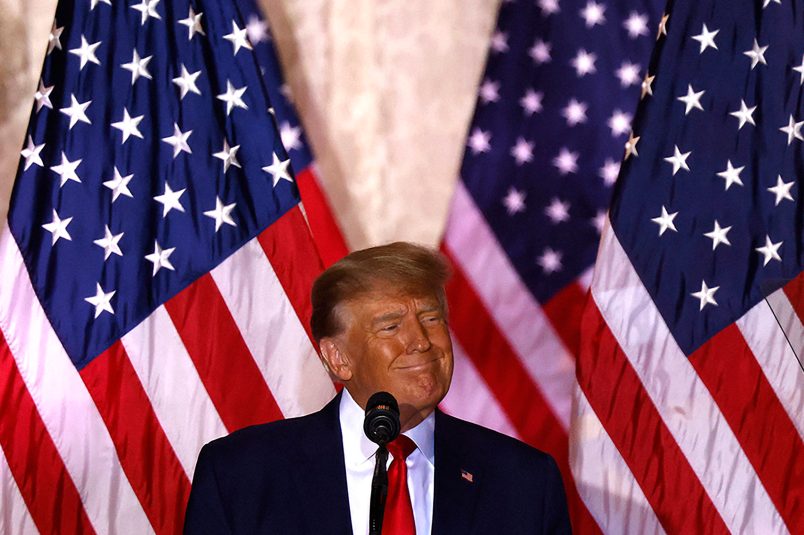U.S. District Judge Aileen Cannon for the Southern District of Florida dismissed the Mar-a-Lago records case against Donald Trump on Monday.
Per the order, Cannon dismissed the case after finding that Special Counsel Jack Smith’s appointment violated the Constitution.
Cannon’s determination that Smith was unlawfully appointed effectively endorses a legal theory tested multiple times in previous cases and dismissed, rooted in the idea that the Attorney General cannot appoint and fund a special counsel absent authorization from Congress. That was seen as an absurd notion, and one contravened by decades of special counsel investigations under the current statute.
But it received a boost both after Cannon held a multi-day hearing on the question and after Supreme Court Justice Clarence Thomas supported the idea in a concurrence in the Trump immunity ruling. Cannon cited that concurrence throughout her order.
The immediate effect of the dismissal will be to end what was seen as the simplest and most threatening of the criminal cases against Trump. Trump’s decision to retain classified records after the government repeatedly asked for them to be returned took place nearly entirely after he left office, and purportedly imperiled some of the most sensitive national security information the government possesses.
In a statement issued late Monday afternoon, Special Counsel spokesman Peter Carr said that Smith’s office would appeal.
“The dismissal of the case deviates from the uniform conclusion of all previous courts to have considered the issue that the Attorney General is statutorily authorized to appoint a Special Counsel,” Carr said. “The Justice Department has authorized the Special Counsel to appeal the court’s order.”
Until Monday, Cannon had mostly ruled in ways that deprived the parties of the ability to appeal, effectively delaying any potential trial until after the November election.
The ruling caps more than a year of stunning decisions from Cannon, beginning in the investigation’s pre-indictment phase. Then, Cannon broke with fundamental principles of criminal law to order a halt to the investigation after Trump filed a civil suit seeking the same.
The 11th Circuit reversed Cannon’s decision, ending that case. But after Trump was indicted in the Southern District of Florida, the case was assigned once again to Judge Cannon.
Cannon’s subsequent behavior sparked heated public speculation over whether she was acting out of ineptitude or malice. But the result has been clear: She took a case over the illegal retention of national security secrets and transformed it into months of interminable delay, avoiding making key rulings and entertaining even Trump’s most tenuous and far-fetched arguments, often by holding full hearings to examine them in great detail.
In this case, Cannon’s decision to dismiss the case by finding that Smith was unlawfully appointed reads more like an appellate – or Supreme Court – ruling than that of a district court judge, typically charged with applying existing precedent.
Cannon’s ruling both nakedly benefits Trump and contravenes rulings issued by other conservative judges. Hunter Biden, for example, moved to dismiss the gun charges against him by arguing that Special Counsel David Weiss was improperly appointed. The judge in that case, a Trump appointee, rejected the motion.
It’s one of many examples in which other judges – even of the same ideological stripe – rejected the legal theory that Cannon endorsed on Monday.
Throughout the ruling, Cannon hemmed and hawed about exactly what her decision impacted. She specified in the order that it would “not affect or weaken any of the protections for classified information imposed in this case or any protective orders pertaining to classified information.”
The ruling suggests that even though the case itself has ended, Cannon is leaving the protections on classified information she imposed in place. It seems like an odd, tacit admission: even though she found a procedural way to dismiss the case against Trump, she recognizes that the substantive issue of protecting classified information remains.
Cannon also notes at the beginning and end of the order that the impact from her ruling is “confined to this proceeding,” and separately remarks that she can’t rule on any retroactive remedy. After all, finding that the special counsel’s funding stream is illegitimate surely should raise some questions about the cumulative millions that he and several other special counsels have spent in recent years.
It’s partly a recognition of the incredibly broad implications that her ruling has: not only Smith, but other special counsels going back years — along with their accumulated indictments — could be called into question were this ruling to be applied at its broadest moment.
That potential breadth also helps hide the seriousness of the charges that Cannon’s order dismisses. Trump allegedly stole boxes of federal records at the close of his administration. Many of those records were highly classified, including documents having to do with military planning, foreign adversaries, and the President of France.
The government took a light hand with Trump, asking him through counsel several times if he could please return the documents. It wasn’t until he failed repeatedly to return all of the records, and allegedly conned his own attorney into certifying that a full search of Mar-a-Lago had been done, that the Justice Department moved to charge him.
He faced additional obstruction charges from this period, including from an episode in which he asked Mar-a-Lago staff to delete CCTV footage from a room in which boxes of illegally held federal records were being stored.
Read the order here:







No bias here. Move along. Nothing to see.
WTAF.
So the attempted assassination moves into old news…
Decided that the Supremes will bail her out. She’s not wrong on that.
hell, she’s probably gotten affirmative assurances in advance.